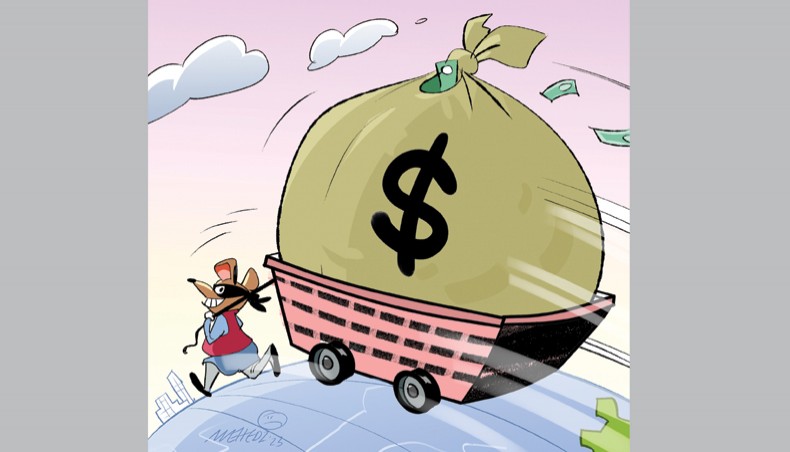Unlawful transactions deepen dollar shortage in Bangladesh
The current foreign currency crunch has continued to hurt the overall economic activities as the government has apparently failed to check hundi and over-invoicing that facilitate capital flights and money laundering.
A series of measures, including import restrictions, have been taken since April 2022 in the wake of the dollar shortage for the import-dependent country.
Import payment has fallen a bit but still the shortage of dollars is there, said former Bangladesh Bank governor Salehuddin Ahmed.
According to him, the dollar crunch will persist unless over-invoicing and hundi can be checked. ‘The government should check over-invoicing immediately for the sake of the economy,’ he cautioned.
Both over-invoicing and hundi are linked to illegal transactions of foreign currencies and responsible for capital flight and money laundering.
The economy has long been bleeding from both the economic menaces, said the economists, referring to data released by local and international agencies and news at home and abroad regarding assets illegally possessed by Bangladeshi citizens in Canada, the UAE, the USA and Malaysia.
The Bangladesh Financial Intelligence Unit reported a 62.33 per cent increase in suspicious transactions and activities related to money laundering in the financial year 2021–22 over the previous financial year.
The Global Financial Integrity, a US-based think tank, found that Bangladesh lost $8.28 billion per year on average between 2009 and 2015 due to trade misinvoicing.
However, Bangladesh did not face major problems in the management of foreign currencies until the start of the current war in Ukraine and the rise in prices of essential items on the global market substantially pushed up its import bills and resulted in the dollar crisis.
Measures, including restricting imports of luxury and non-essential goods, facilitating remittance inflows and easing forex transactions, have been taken by the BB to tackle the shortage.
However, those measures alone may not suffice unless the highest level of cooperation is extended by the banks and other stakeholders, admitted BB governor Abdur Rauf Talukder in a statement in the recently released Financial Stability Assessment Report.
‘Caution in opening import L/Cs is most warranted and import payments need to be made in time so that no country or reputation risk arises. Also, due diligence needs to be ensured in foreign trade transactions so that proper values get reflected in export and import L/Cs,’ said the BB governor.
BB insiders said that some 100 letters of credit had been identified recently, with many of them inflated by 10 to 20 times their actual value.
Former BFIU chief and former BB deputy governor Abu Hena Mohammad Razee Hassan said that political commitment, locally and internationally, was always crucial to contain over-invoicing and under-invoicing.
‘A section of businesses is always active to find out new ways, especially in a crisis period, to resort to over-invoicing,’ he said.
Not only over-invoicing but also the hundi operation has affected the country’s inflow of foreign currencies, said economists referring to a recent disclosure by the Criminal Investigation Department.
The CID on Wednesday said that it started a crackdown on 1,000 illegal money exchange houses pursuant to the recommendations from the BB.
The BB intelligence unit has provided the CID with a list of mushrooming illegal money exchangers suspected of involved in transacting huge amounts of foreign currencies after a staggering 24 per cent appreciation of the dollar against the local currency —taka — over the past six months.
There are 235 money exchange firms, most of them based in Dhaka, operating legally in the country with valid documents from the central bank.
The growing hundi operation has been hurting the inflow of remittances that cushioned the country’s balance of payment.
The remittance inflow dropped to $21.03 billion in the financial year 2021–22 from $24.78 billion in 2020–21 though a huge number of Bangladeshis joined overseas jobs in the meantime and there was an increase in cash incentive announced for the remittance senders.
Policy Research Institute executive director Ahsan H Mansur said that proper policies and their implementation were important in containing hundi operations.
Illegal financial transactions breed corruption and threaten macroeconomic stability, he pointed out.
The country’s forex reserve has sharply fallen to $32 million in Jauary 2023 from $48 billion in August 2021, prompting the government to seek $4.5 billion in loans from the International Monetary Fund.
Economists also linked the growing non-performing loans in the banking sector with the capital flights and the current dollar shortage.
The volume of non-performing loans surged by Tk 31,000 crore to Tk 1,34,396 crore at the end of September 2022 from Tk 1,25,257 crore at the end of June the same year.
According to South Asian Network on Economic Modeling executive director Selim Raihan, non-performing loans do not bring any good to the economy.
‘Such money is mainly invested in unproductive sectors and generates no employment,’ he noted.
He also noted that non-performing loans were likely to grow further in the coming months as the government has no visible move to recover those from wilful loan defaulters.
News Courtesy:
https://www.newagebd.net/article/192874/unlawful-transactions-deepen-dollar-shortage-in-bangladesh











